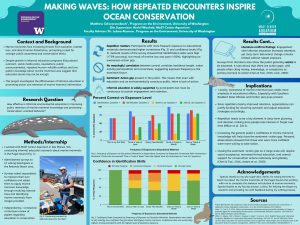Repetition and Retention in Informal Conservation Learning: A Study of Marine Mammal Education Programs
As humans increasingly urbanize waterfronts, deforest old growth, and dismantle ecosystems, interactions between humans and wildlife become more and more frequent (Peterson et al. 2010). In an effort to promote conservation mindsets in the public, a number of movements have come to light in the 21st century. Most notable are the Decade of Science and the International Ocean Literacy movement (O’Brien et al. 2023, Visbeck 2018). These movements revolve around the idea that education, specifically informal education, will be key to preventing these direct human-wildlife interactions and promoting a more conservation-minded public. To investigate the effectiveness of informal education in the world of conservation, I conducted a survey and literature review while working for the MaST Center Aquarium. The data collected from my survey as well as observations made through literature review, indicated that while informal education is impactful, the effects are short-term (Miller et al. 2013). Additionally, there is an observed sentiment-action gap of environmentally conscious people (Chen & Tsai, 2016). The best course of action based on the collected information is to promote repeated exposure to materials, as those who were exposed more often responded at a higher rate of correctness when asked to recall marine mammal facts. Informal education can be extremely beneficial, as it is inexpensive and can reach broad audiences. Increased funding to educating organizations will allow them to continue operations as well as outreach programs in an effort to close the sentiment-action gap and promote a further sense of responsibility in the public.
